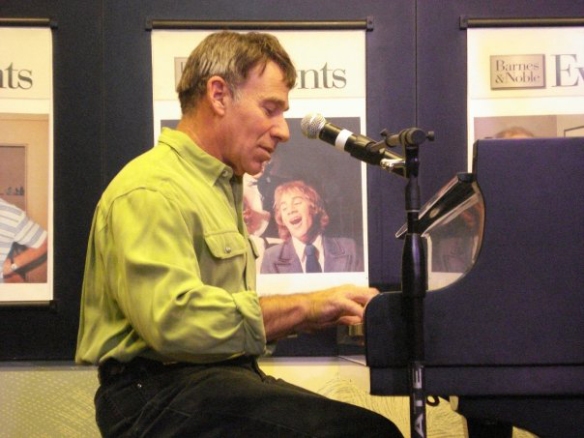Blog Archives
Stephen Schwartz: A Creative Force at Age Sixty-Five
Guest Blogger: Carol de Giere is the author of Defying Gravity: The Creative Career of Stephen Schwartz, from Godspell to Wicked. Today, we are celebrating Stephen Schwartz’s 65th birthday!
A small upright piano arrived at the home of Stan and Sheila Schwartz on Long Island when their son Stephen was seven years old. It wasn’t long before the boy started goofing off from his piano lessons so he could improvise new tunes. No one imaged his creative “noodling,” as he calls it, would become one of his strategies for writing songs for Broadway and Hollywood, including the megahit musical Wicked.
Now, at age sixty-five, Stephen Schwartz still centers much of his work around his pianos, including his two grand pianos at home in Connecticut and one in his New York City office/condo. While writing scores for musicals, he almost never writes notes on paper as a first step. And even though his lyrics have won awards, when he feels his way into a character’s psychology, he likes to keep his hands on the ivories. “It’s my belief that music has a certain internal emotional logic, and therefore it should rule the song,” he says.
Schwartz’s credits to date include numerous stage musicals, such as the Broadway hits Wicked, Pippin, The Magic Show and Godspell. His movie credit list is not too shabby either, including lyrics for Disney’s Enchanted, Pocahontas, and The Hunchback of Notre Dame, and songs for DreamWorks’ The Prince of Egypt.
As he marks his sixty-fifth birthday on March 6, 2013, even with his many achievements he still has no desire to retire. After all, one of his collaborators, Joseph Stein, with whom he worked on The Baker’s Wife and Rags, continued working up until his final days at age ninety-eight. Schwartz is currently penning lyrics for a DreamWorks animated feature as well as songs for a Broadway show about Houdini. (To keep up with his activities, subscribe to The Schwartz Scene newsletter.)
While the songwriter keeps busy writing new musicals, he also takes time to help up and coming composers, lyricists, and librettists through his role as Artistic Director for the ASCAP Musical Theatre Workshop and as President of the Dramatists Guild.
When I was writing his biography, Defying Gravity (Applause Theatre and Cinema Books, 2008), I noticed that Stephen was especially good at talking about his creative process. I decided to include many of his perspectives and tips in a series of “Creativity Notes” so that other writers and fans could enjoy the insights.
For example, one of the challenges that every writer faces is deciding how to work with feedback while maintaining his or her vision for the piece. This is especially critical for success in collaborative arts like musical theatre. As Wicked developed, Schwartz and his collaborator, Winnie Holzman, found it challenging to sort through feedback when everybody around them had opinions. In my Creativity Note about this I included one of Stephen’s reflections about this process: “Ultimately, I think you have to take everything in and understand what in your show is communicating and what’s not—and then write what you think you would like to see, informed, of course, by what you have learned. My experience has taught me that when I write what truly moves, amuses, or interests me, it usually communicates with others.”
As many millions of owners of his cast albums will testify, what Stephen Schwartz writes seems to touch on their own life experience. That’s the magic of creativity at its best.
For more creativity ideas and stories about Schwartz’s creative career, read Defying Gravity and visit the book’s website.
 Defying Gravity takes readers into the creative world of Broadway and film composer Stephen Schwartz, from writing Godspell‘s score at age 23 through the making of the megahit Wicked. For this first authorized biography, de Giere draws from 80 hours of interviews with Schwartz and over 100 interviews with his colleagues, friends, and family. Her sympathetic yet frank narrative reveals never-before-told stories and explores both Schwartz’s phenomenal hits and expensive flops. The book also includes a series of “Creativity Notes” with insights about artistic life, and more than 200 photographs and illustrations.
Defying Gravity takes readers into the creative world of Broadway and film composer Stephen Schwartz, from writing Godspell‘s score at age 23 through the making of the megahit Wicked. For this first authorized biography, de Giere draws from 80 hours of interviews with Schwartz and over 100 interviews with his colleagues, friends, and family. Her sympathetic yet frank narrative reveals never-before-told stories and explores both Schwartz’s phenomenal hits and expensive flops. The book also includes a series of “Creativity Notes” with insights about artistic life, and more than 200 photographs and illustrations.
